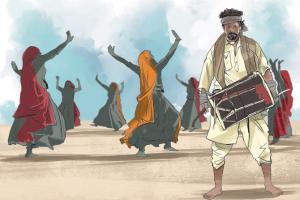In recent decades, Gujarati cinema has scarcely been on the national radar, until Gyan Correa's The Good Road, which won the National Award for Best Film in Gujarati in 2013u00c3u00a2u00c2u0080u00c2u0094but it was made by a Goan

Illustration/Uday Mohite

ADVERTISEMENT
Abhishek Shah's debut feature Hellaro (The Outburst) has won the 66th National Award for Best Feature Film and Special Jury Mention for Best Actress—all the 12 key actresses. It is believed to be the first Gujarati film to win the National Award for Best Film. Ketan Mehta's debut feature Bhavni Bhavai, apparently, won the National Award for National Integration in 1981, and while his Mirch Masala won Best Feature Film in 1987, it was in Hindi. In recent decades, Gujarati cinema has scarcely been on the national radar, until Gyan Correa's The Good Road, which won the National Award for Best Film in Gujarati in 2013—but it was made by a Goan.
Hellaro is a powerful and convincing debut feature, despite its low budget. Based on folklore, it is set in an oppressively patriarchal village in the Rann of Kutch, where the men enjoy themselves, while their women are forbidden from leaving their homes, unless it is to fetch water from a distant pond, and they are frequently thrashed. In 1975, Manjhri, a lovely, partly educated city girl, moves to the village after marrying an Army man. During a drought, when men dance the garba to appease the goddess, the women must fast at home, and Manjhri questions traditions.
One day, they save the life of Mulji, a dholi (drummer) who had fallen unconscious in the desert, by giving him water. When he plays the drum, the women cannot resist dancing the garba. So new is this sensation of joy that the women are terrified they have sinned and will be punished. Later, when a villager's baby girl is born dead, they feel guilty they caused its death, but the mother clarifies it was because the father kicked her when she was pregnant. Again, they feel the goddess is punishing them with drought, but Manjhri reasons, "A goddess need not come suddenly through a man to punish us; she is always with us anyway, and, like our mother, happy when we women are happy."
The trek to fetch water is a precious 'me' time for the women to bond in a space without men, be themselves and enjoy dancing. The dholi is a Harijan, whose wife and daughter died when upper-caste men set fire to his hut. His eyes are always modestly lowered and the women feel safe with him. When the women's dance routine with the 'outsider' is caught out, each woman is thrashed by her husband, and the film's climax has a furious, yet exhilarating outburst from the women.
Shah's direction, though rough-hewn, is heartfelt, convincing and powerfully feminist. The acting by the ensemble cast, led by Shraddha Dangar as Manjhri, and Jayesh More as Mulji, has a raw authenticity. The screenplay and especially dialogues, by Shah, Prateek Gupta and Saumya Joshi, astutely comment on the status of women, in the context of patriarchy, caste, mythology and climate change. Tribhuvan Babu Sadineni's cinematography is evocative, and Prateek Gupta's editing is competent. Mehul Surti's wonderful folk music, including singers such as Mooralala Marwada, elevates the film, and the choreography is lovely, too. It tells you something when the most joyous face in the village is that of the embroiderer-widow Mudi, who escapes to the city with a trader.
The film tributes both Bhavni Bhavai and Mirch Masala, and its oppressive setting, maroons and blacks put me in mind of Govind Nihalani's Rukmavati ki Haveli, a magnificent adaptation of Federico García Lorca's The House of Bernarda Alba. Finally, Mulji also reminds me of BV Karanth's National Award-winning Chomana Dudi (Choma's Drum, Kannada), also about an exploited Dalit drummer.
While Hellaro is unquestionably a good film, far more sophisticated films in other languages were overlooked or deserved better at the National Awards for 2018. The film aims to do the festival circuit and get theatrical release in Gujarat in October.
Meenakshi Shedde is India and South Asia Delegate to the Berlin International Film Festival, National Award-winning critic, curator to festivals worldwide and journalist. She can be reached on meenakshishedde@gmail.com
Catch up on all the latest Crime, National, International and Hatke news here. Also download the new mid-day Android and iOS apps to get latest updates
 Subscribe today by clicking the link and stay updated with the latest news!" Click here!
Subscribe today by clicking the link and stay updated with the latest news!" Click here!






